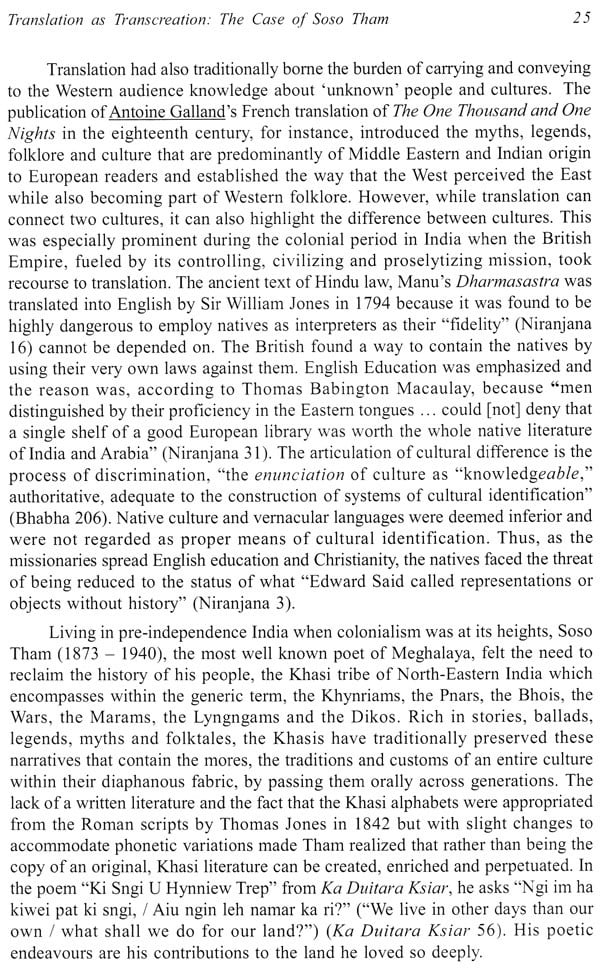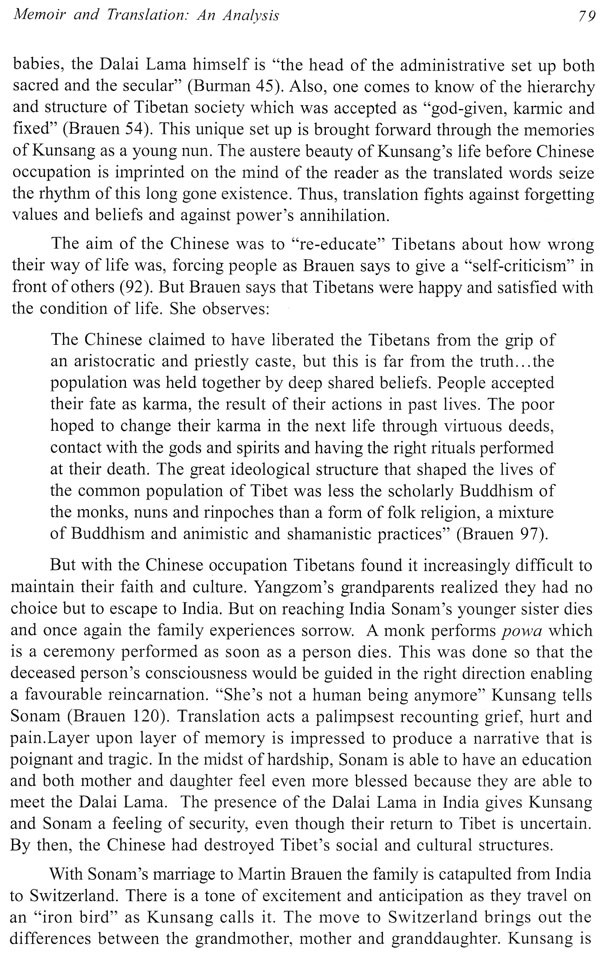
Translation - Transcending Boundaries
Book Specification
| Item Code: | UAW080 |
| Author: | Bobina Wanniang and M.N. Bhattacharjee |
| Publisher: | EBH Publishers, Guwahati |
| Language: | English |
| Edition: | 2017 |
| ISBN: | 9789386302274 |
| Pages: | 136 |
| Cover: | HARDCOVER |
| Other Details | 9.50 X 6.00 inch |
| Weight | 380 gm |
Book Description
The Book The papers published here seek a multi-pronged exploration of the various issues and aspects of translation as a tool for crossing, breaking and transcending boundaries, as well as recent trends and developments in this highly interesting and ever-expanding discipline.
Bobina Wanniang, who completed her Master's Degree from Jawaharlal Nehru University, New Delhi, is an Associate Professor in the Department of English, Shillong College. Her teaching career spans more than twenty five years.
M.N. Bhattacharjee is the IQAC Co-ordinator as well as the Head of the Department of Chemistry, Shillong College. Possessing great organisational skill, his illustrious teaching career spans about thirty years.
(Mrs.) A. Nongbri is an Associate Professor in the Department of Khasi, Shillong College. Besides a number of publications to her name, she has also featured in and hosted a number of TV programmes.
(Mrs.) Shruti Pandey, who completed her M.A. as well as Ph.D. from Benaras Hindu University, is the Head of the Department of Hindi, Shillong College. She has a number of publications to her credit and her interests include painting and reading.
Lorinda Dazel Marak is the Head of the Department of Garo, Shillong College. Besides avid in terest in, and writing about, Garo culture and tradition, she is associated with the State Re source Centre for which she regularly contributes to its adult literacy programmes through her writings.
In today's globalised society, translation and interpreting are gaining visibility and relevance as a means of fostering communication and dialogue in increasingly multicultural and multilingual environments. Practised since time immemorial, both activities have become more complex and multifaceted in recent decades, intersecting with many other disciplines.
It is an acknowledged fact that translation has broadened the literary world and opened doors to new and interesting worlds. Though the act of translation has been carried out for centuries, translation as a field of study is still a relatively young discipline. The work of translation is also a complex process. The changing concepts of nationalism and national language which mark intercultural barriers with sharpness, the opening up of the world and consequent growing interest in previously marginalized and insulated cultures, and the general onslaught of globalization are bound to affect the act of translation. The idea of 'national literature breaks down in the face of expanding globalization, bringing with it modern configurations of knowledge and means of disseminating information. The impact of translation in the modern era asserts the possibility of a unified experience and appreciation of the literature of the world, while at the same time celebrates the multiplicity of languages and culture.
One of the great paradoxes of translation is that it is an amazingly complex and, at the same time, a completely natural act of transmuting knowledge and ideas. The distinction between word for word and sense for sense translation has continued to be a point of debate and this has become more relevant in today's world where urban clichés, portmanteau words and such like are being created every day. While transference gives "local colour" by keeping names and cultural concepts in the Source Language, it can be incomprehensible for those uninitiated in that particular culture. The cultural implications of translation also include ideologies and ways of life in a given culture. The burden of deciding the importance to be given to certain cultural aspects and to what extent it is desirable and necessary to translate them falls on the translator who plays a pivotal role as mediator or interpreter between different linguistic and cultural worlds.
As the scope of this book is vast - from New Horizons in Ch. I to his non-fiction in Ch.VI, I have attempted to give the essence of the book in the last chapter In a Nutshell. V.S. Naipaul's book Beyond Belief was published after I had completed and submitted the manuscript of this book. I have included a note on it in the Appendix.
**Contents and Sample Pages**












